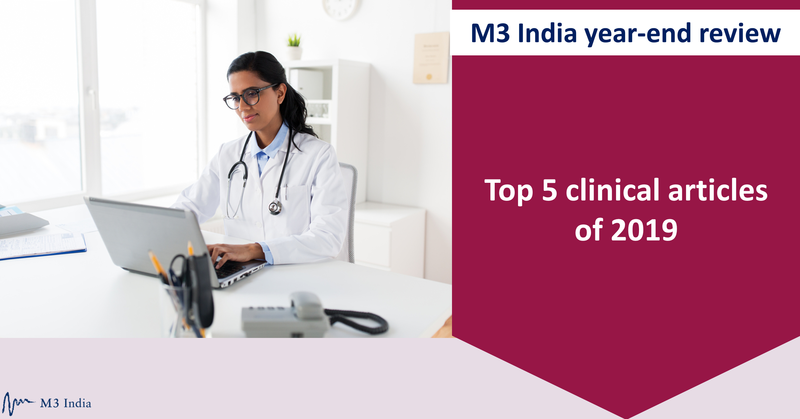Top 5 clinical articles of 2019: Here's what trended on M3 India
M3 India Newsdesk Dec 13, 2019
To end the year on a good note, we give you a roundup of the most popular articles from M3 India in 2019. We will recap 5 of the most read articles for you, from each – clinical, non-clinical and lifestyle categories. Here’s the first one in the series from the Clinical category.

Five of our most popular clinical articles were written by doctors like you. The fact that the articles were so well-received shows the importance you give to patient care and your profession. The chosen topics are based on important and useful information that comes from experienced doctors. So you can read whichever you may have missed or bookmark the ones you need for future use as well.
1. Can you save a victim of bite-related poisoning without Anti-Snake Venom (ASV)?
Accidents such as those of elapids bite and poisoning are frequent in rural areas. But saving a life can be a real challenge without having access to Anti-Snake Venom (ASV)! Dr. H Bawaskar’s article ‘In absence of ASV – How to treat cobra & krait bite and poisoning’ helps you with a quick drug management protocol for such situations.
In the article, Dr. Bawaskar covers the fundamental antidotes to venom action and even provides solutions to different cases that can happen with the victim such as, postsynaptic receptor blockade caused by cobra bite, imbalance of serum electrolytes, neuromuscular conduction, and respiratory infections. The article is worth a read to keep some life-saving information handy.
2. Are you updated with the Glycaemic Index of Indian foods?
Most nutritionists and doctors know GI only for items consumed in the Western countries and advise their patients to alter their diet. Wouldn’t it be better if you knew the GI score of Indian staples, so that your patient wouldn’t have to switch to unfamiliar foods?
Dr. Pradeep Gadge’s write-up – ‘Glycaemic Index of Indian foods’ not only lists the GI score of Indian dishes, vegetables and fruits, but also explains how these foods act on the blood sugar level and impact one’s appetite. He provides various examples to explain the correct way of processing and consuming these foods, so you can help your patient get the most out of a low GI diet.
3. Treating Fatty Liver Disease: To do or not to do, what to do?
Every doctor’s quandary about treatment for a patient of Non-Alcoholic Fatty Liver Disease (NAFLD) is resolved with answers by Dr. Anand V Kulkarni. In his article titled ‘Should all fatty liver patients be treated?’, he puts forth his points of view on different cases.
He also addresses the common doubts and dilemmas, lists the symptoms and risk factors, and gives the exact type of cases, where a specific treatment is advised. The article is a must-read if you often face a similar dilemma with patients of fatty liver disease.
4. Do you have a methodology to treat Hypothyroidism in pregnancy?
The guideline for managing hypothyroidism in pregnancy is yet to be updated. This is why Dr. Alaka Deshpande thought it necessary to highlight the key practice points for physicians through her article ‘Treating Hypothyroidism in pregnancy’.
In the article, she suggests a clinical approach to monitor and normalise serum TSH levels at the right time. Moreover, her suggested methodology on how to investigate Overt Hypothyroidism (OH) and Subclinical Hypothyroidism (SCH) in pregnancy, is invaluable. So give it a read if you still haven’t and share it with your colleagues, too.
5. Have you noticed any of these 5 signs in your patients?
Patients of cardiovascular diseases (CVD) come for treatment after experiencing an unusual episode related to the heart. You would obviously run the necessary tests to identify a specific CVD. But wouldn’t it be better if you could observe signs of CVD in your patients before the episode and recommend tests for investigation?
Through our article ‘5 unusual signs of cardiovascular disease’, we informed you of some noteworthy signs of CVD. These indicators, which seem quite normal in most people, can be a simple but important means of preventing death. After all, observation is one of the skills that makes a good doctor even better.
Clinical articles such as these only add to your knowledge, so read them and bookmark them if you like. If you have already read these topics, we request you to share it with your fellow doctors to enable delivery of high-quality patient care across the country and the world.
To read the other articles in the series- What doctors loved on M3 India in 2019, click below:
Top 5 articles of 2019, beyond medicine; what doctors loved on M3 India!
Top 5 articles of 2019: What trended in travel and lifestyle on M3 India?
-
Exclusive Write-ups & Webinars by KOLs
-
Daily Quiz by specialty
-
Paid Market Research Surveys
-
Case discussions, News & Journals' summaries